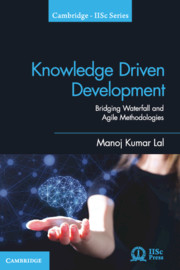Book contents
- Frontmatter
- Dedication
- Contents
- Figures
- Tables
- Foreword
- Preface
- Acknowledgements
- Overview of the Book
- 1 Knowledge Driven Development: What is the Proposition?
- 2 Project Delivery and Supporting Methodologies
- 3 Project Delivery Pain Areas and the Way Forward
- 4 Project Knowledge Model: Context and Definition
- 5 Project Knowledge Model: A Differentiator
- 6 Project Knowledge Model vs Project Documents
- 7 Extending Project Knowledge Model to Cover End-to-End Project Delivery – KDD
- 8 Extended KDD: Pre-Requirement and Post Delivery
- 9 KDD Compliance with Standards of Project Delivery
- 10 Enabling DevOps
- 11 Addressing Contemporary Concerns of Project Delivery
- 12 Helping Existing Methodologies
- 13 Technology Enablers: Tools and Automation
- 14 Suits Factory Model: Needs Cultural Change
- 15 Global Relevance of KDD: GKMF Assisting Skill Development
- 16 Lean KDD: Elimination of Requirement and Test Design?
- 17 Conclusion
- Appendix A Illustrative Non-Functional Attributes
- Appendix B Compliance of PKM with GKMF
- Appendix C Project Estimate and Business Rule/Scenario Framework
- Appendix D Inventory Relationship for Setting up of Security Questions – as per Example in Chapter 6
- Appendix E KDD: Response to Criticism
- Glossary
- References
- Index
7 - Extending Project Knowledge Model to Cover End-to-End Project Delivery – KDD
Published online by Cambridge University Press: 20 October 2018
- Frontmatter
- Dedication
- Contents
- Figures
- Tables
- Foreword
- Preface
- Acknowledgements
- Overview of the Book
- 1 Knowledge Driven Development: What is the Proposition?
- 2 Project Delivery and Supporting Methodologies
- 3 Project Delivery Pain Areas and the Way Forward
- 4 Project Knowledge Model: Context and Definition
- 5 Project Knowledge Model: A Differentiator
- 6 Project Knowledge Model vs Project Documents
- 7 Extending Project Knowledge Model to Cover End-to-End Project Delivery – KDD
- 8 Extended KDD: Pre-Requirement and Post Delivery
- 9 KDD Compliance with Standards of Project Delivery
- 10 Enabling DevOps
- 11 Addressing Contemporary Concerns of Project Delivery
- 12 Helping Existing Methodologies
- 13 Technology Enablers: Tools and Automation
- 14 Suits Factory Model: Needs Cultural Change
- 15 Global Relevance of KDD: GKMF Assisting Skill Development
- 16 Lean KDD: Elimination of Requirement and Test Design?
- 17 Conclusion
- Appendix A Illustrative Non-Functional Attributes
- Appendix B Compliance of PKM with GKMF
- Appendix C Project Estimate and Business Rule/Scenario Framework
- Appendix D Inventory Relationship for Setting up of Security Questions – as per Example in Chapter 6
- Appendix E KDD: Response to Criticism
- Glossary
- References
- Index
Summary
This chapter shows how PKM drives project delivery. PKM is expanded to Extended PKM (EPKM) to include majority of execution and management related activities so that it can cover end-to-end project delivery. It gives rise to Knowledge Driven Development (KDD) – a new project delivery methodology.
The chapter starts with understanding the broad scope of KDD in project delivery. Concepts important to appreciate KDD are detailed. The end-to-end project delivery phases are traversed using KDD via the standard quality gate approach. Other aspects of project delivery such as quality are also considered. Relevance of KDD across domain and types of projects are discussed. At the end, the chapter lists out differentiators that KDD is trying to bring in.
Introduction
As discussed in chapter 4, there are three types of activities in project delivery, i.e., relating to knowledge, execution and management. The project knowledge related activities are the most important and covered by PKM. PKM digitises the project knowledge to an extent that makes it possible to bring in similar digitisation in the activities related to execution and management. PKM can be extended to cover a majority of the execution and management related activities and a new project delivery method can be conceived. This has resulted in the evolution of Knowledge Driven Development or KDD.
As discussed in chapter 2, there are three basic characteristics on which project delivery methodologies are based upon:
a. Structured or empirical
b. Sequential or iterative
c. Full delivery or delivery in increments
Waterfall is structured, sequential and typically full delivery in one go and Agile is empirical, iterative and incremental delivery. KDD can be categorised as:
a. Mix of structured (with its 189 data points of project knowledge) and empirical (evolved over the years based on experience, research and interaction with experts). The ideas may be intuitive but they are not proven yet and hence empirical.
b. Mix of sequential (solution design does not start before requirements are matured to a significant extent), non-sequential (test design and application design start in parallel after solution design) and iterative (once the project knowledge is specified completely, it becomes easy to create build and test execution into logical units, suitable for iteration).
b. c. It has the flexibility of full delivery and incremental delivery depending on need. Due to digital knowledge management, increments can be managed effectively.
Information
- Type
- Chapter
- Information
- Knowledge Driven DevelopmentBridging Waterfall and Agile Methodologies, pp. 140 - 168Publisher: Cambridge University PressPrint publication year: 2018
